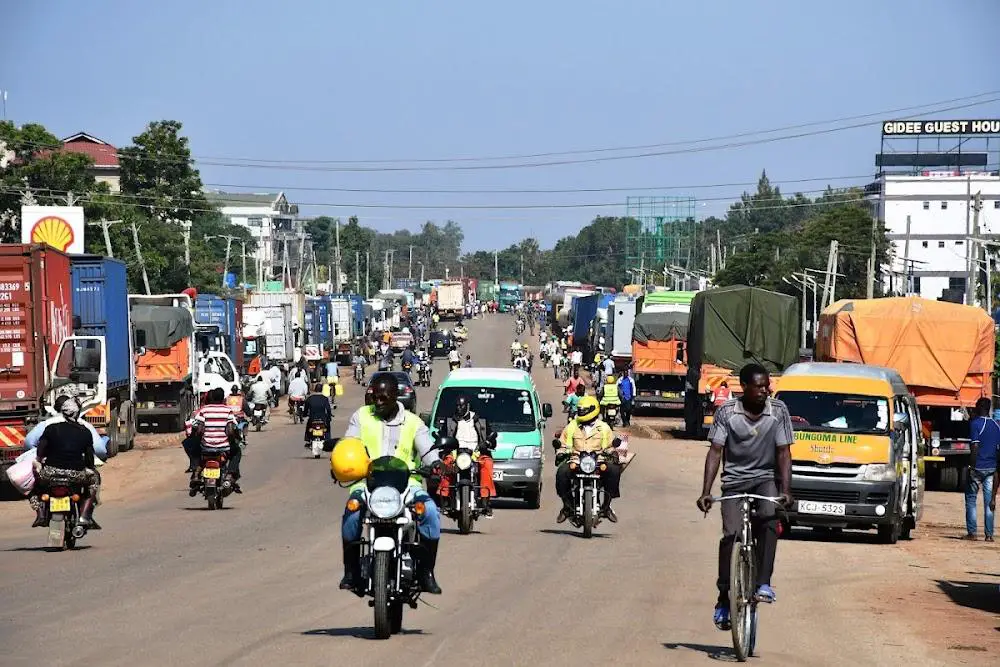- Kenya’s President William Ruto says the free movement was necessary for sustainable growth in the Horn of Africa.
- Dr Ruto calls on member states in the region to eliminate national boundaries that are chocking growth.
- EAC Secretary General Peter Mathuki notes EAC can address challenges in advancing movement of goods and labour.
Barriers to free movement of goods and people are chocking East Africa’s regional integration. To unlock the bloc’s trade potential, Kenya’s President William Ruto is calling in the East African Community (EAC) and the Intergovernmental Authority on Development (IGAD) to remove barriers to free movement. Dr Ruto urges that free movement of people, goods and services can significantly enhance East Africa’s regional integration.
The Kenyan President notes the free flow of goods and capital was necessary for sustainable growth across East Africa.
The President is now challenging regional member states to eliminate national boundaries that have since become impediments to growth. He described national boundaries as old-fashioned and divisive, and urged the region to work together to build bridges of friendship.
“We must not give the credibility to the artificial boundaries that exist in our region and a product of a conference held in Berlin, Germany that partitioned our continent and allocated us boundaries. We must bring down these barriers, convert them to stepping stones and build bridges of friendship,” said Dr Ruto.
Knowledge gap in regional integration
He spoke during the launch of The State of Migration in the East and Horn of Africa report at the Kenyatta International Convention Centre in Nairobi, Kenya. The report is the product of collaboration between the International Organisation for Migration (IOM), IGAD and EAC.
He lauded the report as a valuable contribution that fills a knowledge gap in regional integration, particularly on human mobility.
“I appreciate all the wonderful contributions of EAC, IGAD and IOM, the authors, as well as the entire editorial team.”
Dr Ruto invited policymakers in the region to use the report’s analysis and recommendations to inform their policy-making and implementation efforts. Further, the report could advance the critical element of human mobility, as well as its broader goal of regional integration.
On his part, the EAC Secretary General Peter Mathuki said the report provides policy suggestions on regional integration, and labour migration. The EAC chief added the report gives renders itself to efforts on continued collaboration between Regional Economic Communities (RECs).
Attract private sector investment
‘’Policymakers will find this report a valuable basis for migration-related policy development in an integrated region,” said Dr Mathuki.
He said EAC is working on an improved regulatory environment to provide for labour mobility by creating the necessary infrastructure. The legal framework in refugee-hosting areas will help attract private sector investment and empower the refugees economically. The undertaking is a collaboration between the bloc and UNHCR, IGAD and the African Development Bank (AfDB).
Read also: EAC bloc starts digitizing imported goods tariffs
Currently, the EAC is hosting about 3.3 million refugees with Uganda hosts the highest number at 1.6 million. Kenya is home to 469,414 refugees, DRC (467,744), South Sudan (308,374) Tanzania (191,042), Rwanda (128,064), and Burundi 110,000.
Despite the challenges, migration has also brought about some positive contributions in the region. Some of the benefits include the transfer of skills and knowledge, financial remittances and the creation diverse communities.
Harnessing the benefits of intra-African trade
The EAC Secretariat has pledged its commitment to continue supporting Partner States to implement the recommendations from the report.
In its 12 chapters, the report examines the mobility aspects of migration along three umbrella themes. The first is free movement of goods, services and persons as essential to harnessing the benefits of intra-African trade. I also tackles labour mobility and economic integration. Safer human mobility and integrated border governance, especially through One-Stop Border Posts is equally addressed.
The IOM Regional Director for East and Horn of Africa Mohammed Abdiker said the report provides contemporary thinking on mobility. By focusing on regional integration, it serves as an intellectual compass for regional economic communities and governments.
IGAD Executive Secretary Workneh Gebeyehu said the authority stands ready to implement the recommendations, jointly with Member States and partners.
Climate change in shaping mobility of persons
The report is the first comprehensive analysis of the mobility dimensions of regional integration. It covers among others migration and mobility trends, trade and mobility, labour mobility, and cross-border health. Issues on climate change and human mobility, sustainable reintegration, gender, integrated border management, digitalization are also tackled.
The analysis covers 12 countries including Burundi, Djibouti, the Democratic Republic of Congo, Ethiopia, Eritrea, Kenya, Rwanda, Somalia, South Sudan, Sudan, United Republic of Tanzania and Uganda.
It highlights that access to health remains an essential part of ensuring cross-border movement is safe. With changing weather patterns, it notes that climate change plays a major role in shaping mobility of persons.
The report also highlights gender equity as a cross-cutting and critically important face of human mobility and regional integration.
